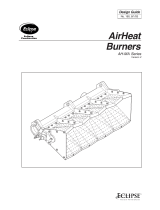Page is loading ...

Circular INCINO-PAK® Burners Page 5753
7/92
Design and Application Details
Determine air stream flammability limits
and/or minimum oxygen content levels.
Since oxygen content within the effluent is critical
to the flammability range of any raw gas type burner,
it also directly affects the maximum capacity (Btu/hr)
of a Circular INCINO-PAK® Burner.
The chart (below) graphically relates the incoming
air stream temperatures (°F) and the measured
percentage of oxygen remaining in this effluent.
Any combination of temperature and oxygen
level falling above the raw gas firing diagonal line
should support combustion with a raw gas Circu-
lar INCINO-PAK® Burner system.
CAUTION: Combinations of incoming tempera-
tures and measured percent of oxygen falling
below the diagonal line are not acceptable
applications for the raw gas Circular INCINO-
PAK® Burner. Alternate choices may be selected
from Maxon catalog sections 4200 and/or 5700.
Profiling for higher temperature
applications
When calculating profile dimensions for Circular
INCINO-PAK® Burner systems in applications with
higher inlet air temperatures, greater temperature
rises, and/or variable air stream volumes, the effluent
with elevated temperatures and densities must be
considered.
Burner Design Parameters
Temperature limits:
Inlet 1200°F (649°C)
Outlet 1700°F (927°C)
Burner net free areas:
4M size 110 square inches
8M size 170 square inches
Calculating Circular INCINO-PAK®
Burner capacity requirements in
effluent air streams:
Sample calculations for designing a raw gas
Circular INCINO-PAK® Burner system for a thermal
fuel incinerator (with 16+% oxygen level) are provided
on the following page.
To calculate heat requirements, you must know:
SCFM of effluent air stream
°F inlet air temperature
°F outlet air temperature
Maximum
Temperatures

Page 5754 Circular INCINO-PAK® Burners
Performance Selection Data
Design procedure and calculation example
(continued)
CFH gas
Evolvement of “K” = x 1000
SCFM air
Enter chart at 700°F inlet temperature line (from step
3); follow across to intersect the 1500°F discharge
temperature sloped line, then drop straight down to
read the “K” multiplier factor of 1150.
Therefore, the maximum heat input required:
Btu/hr = 5000 SCFM x 1150 = 5,750,000
Calculating Circular INCINO-PAK® Burner
profile opening:
6. “Net” profile opening calculations:
ACFH
1655 x “K” x inches wc drop
specific gravity
ACFH = SCFM x 460 + inlet temp. x 60 min/hr
460 + ambient temp.
“K” = 0.78 orifice coefficient for Circular
INCINO-PAK® Burner profile opening
Inches wc drop = desired pressure drop
(see optimum range on page 5755)
Specific gravity = 1.0 x 460 + ambient temp.
460 + inlet temp.
7. “Gross” opening calculations:
Gross opening =
net area + (425.6 in2 – burner net free area)
(from (approx. area (from chart
step 6) of extension pg. 5753)
sleeve blockage)
Radius = Gross opening
3.14
Diameter = 2 x radius
General Selection Procedure
1. Determine available oxygen level in air stream
to be heated.
For a raw gas application, we will use 16+%
oxygen level.
2. Determine the SCFM of air through the incinera-
tor. Include any variations in this flow.
For our calculations, we will use a constant
volume air fan of 5000 SCFM.
3. Determine inlet temperature of effluent to
Circular INCINO-PAK® Burner.
We will use inlet temperature of 700°F.
4. Determine outlet or discharge temperatures
from the incinerator.
For our example, we will design for 1500°F.
5. Calculate maximum total heat required.
Btu/hr = SCFM x “K”
(from step 2) (from chart below)
Multiply SCFM of air by multiplier (K), which
combines hypothetical available heat and a 1.08
composite air heating factor to give the value in Btu
required being “gross heating value” of fuel. Since
multiplier (K) varies with inlet and discharge air
temperature, the various factors are graphically
shown below:
For 1300°F, 1500°F and 1700°F
discharge temperatures
Net Area (in2) =

Circular INCINO-PAK® Burners Page 5755
7/92
Performance Selection Data
Required natural
gas inlet
pressures (in
inches wc) for
capacities shown
Capacities (Btu/hr)
4M 8M
Series “G” Circular INCINO-PAK® Burners
Performance Data
Duct static pressure drop
through profile plate
(inches wc)
Approximate air stream
velocities (SFPM)
18" wc 6,000,000 12,000,000
12.5" wc 5,000,000 10,000,000
8" wc 4,000,000 8,000,000
4.5" wc 3,000,000 6,000,000
3.2" wc 2,500,000 5,000,000
2" wc 2,000,000 4,000,000
1.125" wc 1,500,000 3,000,000
0.5" wc 1,000,000 2,000,000
0.125" wc 500,000 1,000,000
450,000 900,000
0.08" wc 400,000 800,000
350,000 700,000
300,000 600,000
0.03" wc 250,000 500,000
200,000 400,000
150,000 300,000
0.005" wc 100,000 200,000
50,000 100,000
0.2 0.3 0.4 0.5 0.7 0.91.0 1.2 1.5 2.0 2.5 3.0 4.0
1500 1750 2000 2500 3000 3500 4500 5500
Operations in gray
shaded areas require
special consideration
Optimum
Design
Area
Operations in gray
shaded areas require
special consideration

Page 5756 Circular INCINO-PAK® Burners
Envelope Dimensions (in inches)
Series “G” Circular INCINO-PAK® Burner with wall mounting plug
Series “G” Circular INCINO-PAK® Burner for through-wall mounting
Spark Ignitor

Circular INCINO-PAK® Burners Page 5757
10/12
Component Identification
Suggested spare parts
– Spark ignitor assembly
– Extension ring
To order parts for an existing Circular INCINO-PAK®
Burner assembly, list:
1. Name(s) or part(s) from above illustration
2. Quantity of each required
3. Burner nameplate information:
• size and series number of burner
• designation
• if available, serial number of Maxon fuel shut-off
valve in-line to burner (This serial number is on
Maxon valve’s nameplate.)
Nameplate
F.O. NUMBER ASBY. NUMBER
www.maxoncorp.com
50098
C INCINO-PAK
IRCULAR
R

Page 5758 Circular INCINO-PAK® Burners
Notes
/

